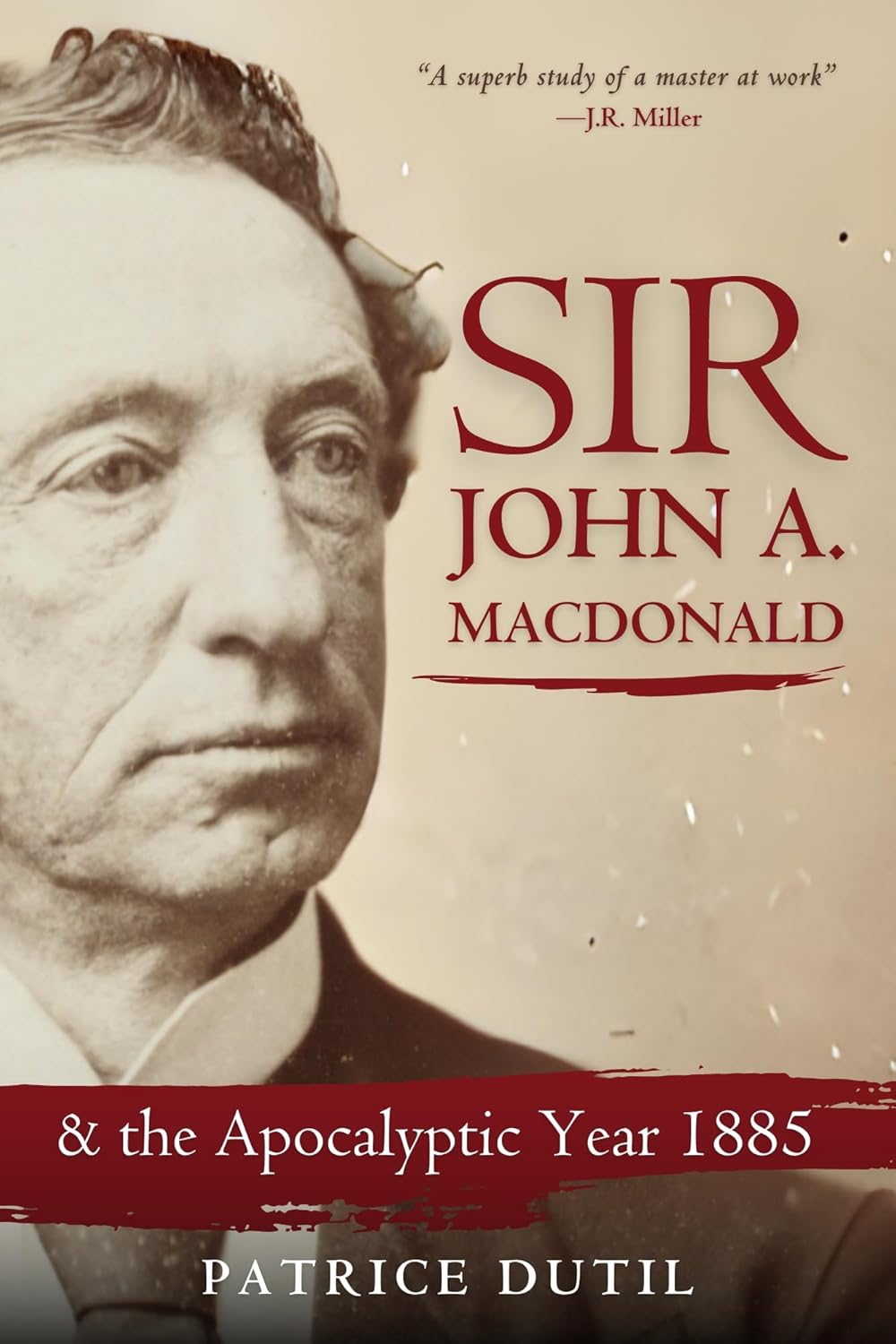Book Reviews

Welcome to the Book Review section of the Canada History Society website, where history comes alive through the written word. This dedicated space is your gateway to exploring insightful critiques and analyses of books that shape, challenge, and deepen our understanding of Canada’s past.
John A Macdonald - 1885

A Review of Patrice Dutil's Sir John A. Macdonald and the Apocalyptic Year 1885
Patrice Dutil’s Sir John A. Macdonald and the Apocalyptic Year 1885 is a remarkable study of a pivotal year in Canadian history—a year that, as Dutil convincingly argues, tested the resolve, vision, and legacy of Canada’s first prime minister. With meticulous research and a narrative as compelling as it is thoughtful, Dutil presents 1885 not simply as a year of crises but as a crucible in which Macdonald’s leadership was forged anew. Through Dutil’s lens, we see Macdonald not merely as a politician but as a figure whose decisions would profoundly shape the destiny of Canada.
Dutil’s central thesis is that 1885 was a year of unprecedented turmoil, one in which Macdonald faced challenges that threatened to unravel the still-fragile Dominion of Canada. These included the Northwest Resistance, the execution of Louis Riel, the ongoing construction of the Canadian Pacific Railway, and questions of national unity that reverberated across linguistic and cultural divides. Dutil examines these issues with a keen eye for detail, offering a balanced assessment of Macdonald’s actions and the broader implications of his leadership. “Macdonald was not a man without flaws,” Dutil writes, “but in 1885, he was the right man to steer Canada through a tempest that could have capsized its fragile vessel” (Dutil, 2023).
The Northwest Resistance and the Riel Question
A significant portion of the book is devoted to the Northwest Resistance, a confrontation that brought to the fore issues of Indigenous and Métis rights, governance, and the use of military force in the nation’s hinterlands. Dutil’s treatment of Macdonald’s handling of the conflict is nuanced. While acknowledging the prime minister’s firm belief in the rule of law, Dutil does not shy away from critiquing Macdonald’s reliance on force and his dismissal of Métis grievances. “Macdonald understood that the Northwest was key to Canada’s future, but his policies betrayed a deep misunderstanding of its people,” Dutil asserts, highlighting the prime minister’s failure to address longstanding concerns over land and representation (Dutil, 2023).
The execution of Louis Riel, which followed the resistance, looms large in Dutil’s narrative. Riel’s trial and eventual hanging divided the nation, deepening the rift between English and French Canadians. Macdonald’s decision to allow the execution—despite appeals for clemency—was, as Dutil notes, both a political and moral choice. “To Macdonald, Riel was a traitor,” Dutil explains, “but to many, especially in Quebec, he was a martyr. Macdonald’s choice to prioritize national order over sectional sentiment would haunt him for the rest of his career” (Dutil, 2023). This duality—the pragmatist and the politician—is central to Dutil’s portrait of Macdonald in 1885.
The Canadian Pacific Railway: A Triumph of Vision
Amid the crises of 1885, the completion of the Canadian Pacific Railway emerges as a counterpoint to the year’s darker moments. Dutil lauds Macdonald’s unwavering commitment to the railway, describing it as “a triumph of vision and determination that solidified Canada’s place as a nation from sea to sea” (Dutil, 2023). The railway was not merely an economic project but a symbol of unity, linking the disparate regions of the Dominion and securing its western territories against American encroachment.
Dutil’s examination of the railway’s construction is deeply informed by archival research, including correspondence and parliamentary debates. He highlights the immense logistical and financial challenges involved, as well as Macdonald’s deft maneuvering to secure funding and public support. Yet, Dutil is not uncritical. He acknowledges the exploitation of Chinese labourers and the environmental costs of the project, presenting the railway as both a monumental achievement and a reflection of the inequalities of its time.
The Question of National Unity
A recurring theme in Dutil’s work is the question of national unity, a challenge that defined much of Macdonald’s tenure. The events of 1885—particularly the Riel execution—brought this issue into sharp focus. Dutil deftly explores how Macdonald navigated the competing demands of English and French Canada, Indigenous and settler communities, and eastern and western provinces. “Macdonald’s genius lay not in solving these conflicts but in managing them, holding the country together by the sheer force of his personality and political skill,” Dutil writes (Dutil, 2023).
Dutil also examines the broader cultural and political climate of 1885, situating Macdonald’s decisions within the context of a young nation still grappling with its identity. From debates over immigration policy to questions of governance in the western territories, Macdonald’s actions were guided by a vision of Canada as a unified, prosperous, and self-reliant nation. Yet, as Dutil makes clear, this vision often came at a cost, particularly for marginalized groups.
A Balanced Portrait of Leadership
What sets Sir John A. Macdonald and the Apocalyptic Year 1885 apart is Dutil’s balanced approach. He neither lionizes nor vilifies Macdonald, instead presenting him as a complex figure shaped by the constraints and opportunities of his time. Dutil’s prose is both evocative and precise, capturing the high stakes of 1885 while grounding his analysis in rigorous scholarship.
For example, Dutil’s description of Macdonald during the debates over Riel’s fate is particularly compelling: “He was weary, beset on all sides by critics, yet resolute. To his allies, he was a pillar of strength; to his opponents, an immovable object. In truth, he was both” (Dutil, 2023). Such passages reveal Dutil’s ability to bring historical figures to life, making their dilemmas and decisions resonate with contemporary readers.
Patrice Dutil’s Sir John A. Macdonald and the Apocalyptic Year 1885 is a masterful exploration of a transformative year in Canadian history. Through meticulous research and insightful analysis, Dutil sheds new light on the challenges that defined Macdonald’s leadership and the enduring questions of national identity, unity, and justice. The book is a must-read for anyone seeking to understand the complexities of Canada’s past and the man who played a pivotal role in shaping its future.
Dutil’s narrative reminds us that history is not simply a record of events but a dialogue between the past and present. In examining 1885, he offers not only a portrait of Macdonald but a lens through which to consider the broader forces that have shaped Canada. As he writes in his conclusion, “The apocalyptic year of 1885 was not the end of Macdonald’s Canada, but a reckoning—a moment when the young nation was forced to confront its divisions and rediscover its resilience” (Dutil, 2023). This is history at its finest: richly detailed, profoundly human, and deeply relevant.
________________________________________ Bibliographic Reference Dutil, P. (2023). Sir John A. Macdonald and the Apocalyptic Year 1885. Toronto: Dundurn Press.


